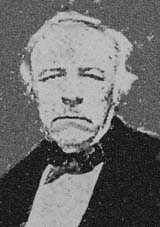Student-run Philomathesian Society forms
~1800-1803
The Philomathesian Society, founded by Henry Chipman ’03 as the first student society at Middlebury, was open to all students to discuss questions of politics, religion, education, and morality. In their weekly meetings students would explore questions such as “Is party spirit necessary to the support of a republican government?” and “Would an equal toleration of all religion be beneficial?” An important aspect of their work was keeping a student-run library that out-performed the College’s with a broader selection of history, biography, and contemporary fiction. The library was much more accessible to students as it had longer hours and fewer restrictions on borrowing. According to David Stameshkin, “The Philomathesian and other debating societies also gave students a chance to organize their own activities outside the purview of the faculty” (Vol. 1, 100).
Middlebury grants honorary degree to Universalist Samuel C. Loveland
June 1829
While Middlebury was a difficult place to be non-Congregationalist in the early 19th century, one Universalist student made his presence known. In an act of forcing the institution to act in accordance with its nominal non-sectarianism, student Thomas J. Sawyer ’29 “used his good standing in the college community to convince the trustees to bestow an M.A. degree upon his religious mentor,” Samuel C. Loveland. At Sawyer’s graduation ceremony Loveland was granted the first honorary degree to a Universalist in the USA.
Anti-secret society organizing begins
1844
After the first fraternity chapter was formed at Middlebury — the Alpha Mu chapter of Chi Psi in 1843 — the college administration officially banned such organizations. When Chi Psi was allowed to continue to meet underground because “its early members included men who were known for their academic excellence and outstanding Christian character,” a group of students organized a student meeting to condemn the existence of secret fraternities at Middlebury (Vol. 1; 175). This sort of active student opposition to the exclusivity of fraternities continued over the years, specifically about a decade later in 1856 when when a second secret society was formed and an anti-secret society called Delta Epsilon emerged in opposition.
KDR is founded as a critique of fraternity system
1905
In 1905, ten “neutrals” (students who were not part of the dominating fraternity system) formed the Kappa Delta Rho (KDR) fraternity in the hopes that it “would not condone the pranks, drunkenness, and elitism allowed by the other fraternities” (Vol. 1; 263). KDR was one of the first official organizations that came out of years of Middlebury students mobilizing to create student groups that would offer the social and political benefits of fraternities without the elitism, raucousness, and unfounded power of the fraternities within the official Greek system. KDR went on to become the Alpha chapter of a national fraternity.
Middlebury’s Women’s Athletic Association is founded
1912
In 1912 Middlebury’s Women’s Athletic Association formed and marked the beginning of years of women organizing for athletic rights. The organization started by organizing basketball games that were only open to “women of the college, faculty wives, and friends” (Vol. 1; 270).
